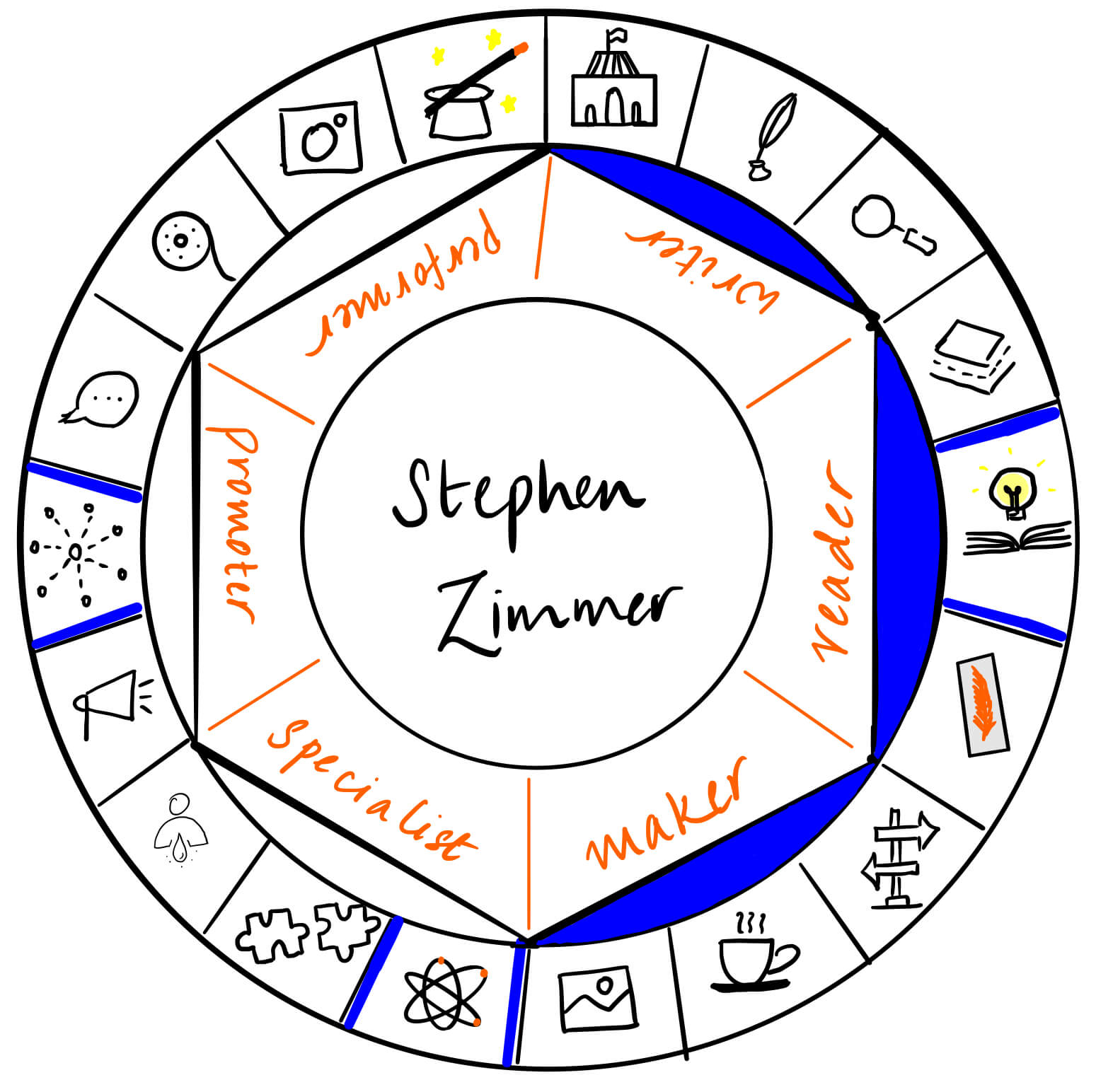
Last couple days have been about having #ArmedWithABingo author features and today is the final one – it is time to talk to an author + publisher, Stephen Zimmer. Previously on The Creator’s Roulette, I’ve had authors share about their publishing path – S.Kaeth elaborated on indie publishing and Amanda shared her insights in the traditional publishing route. This conversation with Stephen is to learn more about indie publishing and owning an indie press. Recall that all our giveaway books come from indie publishers and authors and most of my conversations in The Creator’s Roulette are with members of these amazing communities.
Stephen’s book Heart of A Lion is in our first quarter giveaway, check it out on Goodreads after reading this post.
Welcome, Stephen! You are a reader, writer, publisher, podcast host, editor… I am going to call upon the publisher persona today. What made you start your own indie press, Seventh Star Press?
Thank you for having me as a guest, Kriti, it is always an honor to be on Armed With a Book!
Late in 2008, I had been working with a very talented editor named Amanda DeBord on the manuscript of my first published novel, The Exodus Gate. I was at a crossroads trying to decide whether to self-publish, seek a larger traditional route, or pursue a smaller press outlet.
A good friend named Matt Perry, who was an artist and graphic designer, talked with me often regarding the book side of things and I realized that the core needed to start a small press was present right there between Amanda, myself, and Matt.
I took on the mantle of starting the business, while Matt and Amanda participated in many early projects as we began to add new authors. Eventually, we grew to the point where more editors and cover artists were needed for the level of output we reached. Today, we have a family of nearly 30 authors, work with many editors and artists, and have well over 150 titles in our catalogue in print, eBook, and audiobook formats
All of this has been done with the same aim: to release well-presented, quality fiction and help the authors in our family realize their creative visions.
What has been the biggest hurdle for publishing for you?
Without question, a flooded market. When there is an avalanche of new titles coming out in the book market on a weekly basis, it is a big challenge for any press or self-published author to raise awareness. Small presses work on very limited budgets, so it is a real challenge to decide where to allocate limited resources with the myriad of promotional services, advertising channels, and market sites available.
Facebook, Amazon, and Bookbub ads alone can quickly consume what little you can spend in a given month, so you have to really do your best to decide what to advertise, when to promote it, and how to present it. Marketing and publicity is definitely one of the hardest and most time-consuming tasks of a publisher.
How many titles does your indie press release in a year? Are there certain genres that you focus on?

At the moment, we release about two new titles a month, on average. We have also been taking our catalog into the audiobook realm, adding another one to three audiobook releases in a given month, in addition to the brand new titles.
For many years, speculative fiction was our only focus, but we have started to develop new imprints. Seventh StarShadow was our first imprint, with a focus on mystery and thriller titles.
Seventh StarShadow launched with the release of Dan Jolley’s thriller The Storm and has since seen several other releases by authors such as Michael Houtchen, Tommy B. Smith, and Carol Preflatish. We will soon be debuting a romance imprint and an imprint for children’s books.
That is exciting news, Stephen! This question is especially important to our authors out there who are looking to get published and would end up working with your imprints – what do you look for in a manuscript that you’re thinking of acquiring?
As a small press, we are seeking unique voices with stories that are not clones of popular releases. The story is most important.
We are confident in our editors and can work with a writer who may have some rough edges when it comes to their mechanics. We can help correct those kinds of things, but the story must be compelling and have the kinds of characters that readers connect with.
I definitely encourage readers to put in a little extra time with the first line and early paragraphs of a manuscript. A manuscript that engages and grabs a reader right away is likely to make a strong impression that raises interest to invest more time in reading the manuscript to make an evaluation for potential publishing.
We also look for authors who conduct themselves in a professional manner. From the development of a manuscript to the steps of the publishing process, we need an author to have a professional work ethic in attending to edits, discussing cover ideas with the cover designer or artist, and reviewing galleys, among other things. Beyond the release of a book, an author’s behavior at events and on social media reflects upon us, and we seek the kind of individuals who will not conduct themselves in irresponsible or reckless ways that alienate readers and others in the book community.
An early indicator of this is whether an author is able to follow guidelines for their manuscript submission. If an author is not willing to pay attention to simple guidelines, then they are not likely to be dependable in the many areas necessary for publishing a book.
Just remember when you are submitting to a publisher, guidelines are not suggestions!
What role do agents, editors, and book bloggers play in your mind in the publishing world?
As a small press, agents do not play a major role in our world, as we do not require an author to have one to reach out to us for publishing consideration or the solicitation of a manuscript. In general, an agent is a requisite if an author wishes to get published by one of the major presses or a larger independent press. Small presses, in most all cases, can be approached directly by the author.
Book bloggers are of the greatest importance to small presses and self-published authors. Book bloggers providing honest critical reviews are one of the greatest sources of feedback for both the author and the publisher. Further, book bloggers help authors and publishers in putting new titles before the eyes of potential readers, and also spreading the word to other book bloggers in the community who may also like the author’s work. Book bloggers also provide more exposure of authors (and, in turn, get good content for their blogs) through hosting an author for an interview or guest post.
Editors are an absolute necessity in the publishing process. Within a small press, an editor often tackles multiple areas of editing from copy to content, entailing developmental aspects, line edits, and all manner of corrections. It is certainly not an easy task to undertake, but an editor is the guardian who watches the author’s back and helps them to strengthen and achieve their visions. A well-edited book is very apparent when the reviews begin to come in from readers and formal reviewers alike. All paths of publishing, whether small press, major press, or self-published, must involve professional editing in order to produce a high-quality release.

Are there any interesting trends that you have seen in the last couple years on the publishing side?
In the last couple of years, I have seen a definite surge in the popularity and growth of audiobooks. The audiobook market is fast becoming a major component of the book publishing world.
There has also been an increase in interest for the print format after years of decline following the introduction of eBooks. The resurgence of print books is also being fueled strongly by younger readers based on the conversations I have had with librarians, other publishers, and event attendees. It is interesting to see readers raised in a digital environment embracing a tangible medium like print.
Sites like Amazon have become more difficult for small presses and self-published authors in terms of visibility, following changes in the kinds of books displayed and presented on an individual book title’s sales page. Sponsored titles have taken places on the page where an author’s other titles previously could be seen, which had a big effect on sales.
Along similar lines, there has been an unfortunate rise in the number of legitimate book blogger reviews (and reader reviews) that have been removed by Amazon. For many authors with lower review counts, this can be very hurtful, and nothing more than the fact that the reviewer was connected to the author on social media is used to justify the deletion. It is a perfectly normal situation for a reviewer of an author’s work to be connected with an author on something like Facebook, where they can ask questions about the book, conduct followup interviews, or place requests for new titles.
Another trend is the rise of small independent booksellers as larger chains close or reduce the number of locations that they operate. I have always found these smaller bookstores to be owned and staffed by individuals who have a real passion for the written word. It is a leaner market for sure, but it is being driven by individuals who have a love for books as much as they do the business aspects.
In terms of outlets for exposure, BookTubers have really grown in number and popularity, creating a vibrant new video community that is a good complement to the text and graphic-based book blogs.
Are there any lessons or experiences as a publisher that has changed you as an author?
Working on the publishing side has deepened my appreciation of editors, layout/design artists, and everyone else involved in the process.
- I strive to turn in the cleanest text that I can to my editors, so they can put a greater focus on content.
- It has improved my ability to write a synopsis or blurb, as I have gained better understanding of what helps market a book.
- I have also found myself taking more time to provide extensive notes to help guide cover artists.
As far as my writing itself, I have always pushed myself to hone my craft and improve with every new release. But that fits well with publishing, as it honors the entire process in the best way possible.
Tell us a bit about your books! One of them in the #ArmedWithABingo giveaway and we are so happy to have you share it with our readers.
Currently, I have sixteen titles in print and twenty-four in eBook spanning several areas of speculative fiction. To date, three titles have been released in my epic fantasy Fires in Eden Series, while four titles have been released in my cross-genre, dystopian, apocalyptic Rising Dawn Saga. My ancient world heroine Rayden Valkyrie has been featured in the Dark Sun Dawn Trilogy (all three books have been released) and five stand-alone eBook novellas (3 of which are featured in volume one of a print compendium series). Ragnar Stormbringer, a warrior from the same world as Rayden, is spotlighted in four stand-alone eBook novellas (3 of which are in volume one of that print compendium series).

I also have one book out in a YA Dystopian series called the Faraway Saga. I do have some horror as well, with two volumes of short stories out in a themed collection series called The Hellscapes. Last, but not least, I have a volume of short stories out that are set in the same world as my Fires in Eden series. Some steampunk short stories involving my protagonists Harvey and Solomon (Harvey is a cat!) were included in an anthology series called Dreams of Steam.
I’ve been fortunate enough to cover a lot of ground in my current body of work, but I can assure you that I have a lot in the pipeline for the near future as I focus on new titles in all of my series, new stand-alone novellas, and more!
I am a huge fan of Rayden and can’t wait to read your other works. Thanks for giving us a glimpse of your world, Stephen! 🙂
Do you have any questions about indie presses? Ask them in the comments!
Want to connect with Stephen? Here are ways to find him on Twitter and Facebook. You can also learn more about his indie press Seventh Star Press on their website.

Cover Photo by Joyce McCown on Unsplash
Photo of book and crystal ball on unsplash.

Hallo, Hallo Kriti,
I’ve known Mr Zimmer the full seven years I’ve been a book blogger (which I am celebrating on the 31st as it marks my 7th Year) as he was one of the first blog touring companies who took a chance on me as a book blogger seeking to make connections within the publicity and marketing side of publishing in Autumn, 2013. Loved reading his responses – a lot of fond memories for me as I’ve seen the growth of Seventh Star Press whilst hosting their authors, reading their stories and championing the collective works of their niches of genre I love to read. Truly a wicked brill convo and I’m glad I found the tweet tonight! Great boost of spirits too, as I’ve had a hard week – trying to get back into the joy of blogging and basically find a way to ‘reset’ after last week’s upturnt chaos and stresses.
I was nodding along to a lot of what he’s sharing – again, I’ve learnt loads being a book blogger and especially understood the blurred lines between authors & bloggers; as it is not only to follow-up with interviews, reviews, new releases, etc but also, there are times where you develop a friendship with an author you’ve discovered and you maintain connected as their career continues to grow. This is another reason I am thankful I didn’t get into cross-posting reviews – except on LibraryThing and I want to explore being more active on Litsy now that I have my toes wet on Reddit. I gravitate towards non-commercial sites to re-share my reviews and to link to my blog because I like to continue the conversations I begin on my blog in social reading gathering places. To me, that is the best way to share our content and our readerly lives – to keep the readers engaged and enlightened by what we have to say and share.
Again, loved the conversation!